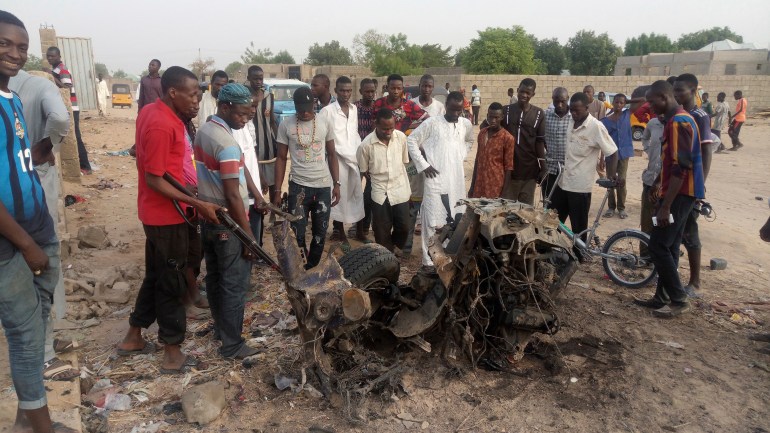Northeast Nigeria conflict killed more than 300,000 children: UN
A study published by UNDP finds death toll caused by 12 years of violence is 10 times higher than previous estimates.

A 12-year-old conflict in northeast Nigeria has caused, directly and indirectly, the deaths of some 350,000 people, the vast majority of which are children below the age of five, the United Nations found in a new report.
The death toll, given by the UN Development Programme (UNDP) in a new study on the war and its effect on livelihoods published on Thursday, is 10 times higher than previous estimates of about 35,000 based only on those killed in fighting in Nigeria since violence broke out.
Keep reading
list of 4 itemsSurging inflation in Nigeria fuels crime wave, says World Bank
Policeman killed, 80 students abducted in Nigeria school attack
Gunmen storm villages, kill 53 in Nigeria’s Zamfara state
The armed group Boko Haram launched an uprising in 2009 displacing more than two million from their homes and spawning one of the world’s worst humanitarian crises, with millions of people dependent on aid. The conflict shows little sign of ending.
Children younger than five account for some 324,000 deaths, more than nine out of 10 of those killed, with 170 dying every day, the UNDP said.
Of nearly 350,000 deaths from the conflict, it estimated 314,000 to have resulted from indirect causes.
Insecurity has led to declines in agricultural production and trade, reducing access to food and threatening the many households that depend on agriculture for their livelihood, the UN said.
Thousands of displaced people lack access to food, health facilities, shelter and clean water, with children more vulnerable, the report added.
“With another decade of conflict, that could grow to more than 1.1 million,” it said.

Nigeria’s Boko Haram group split into two in 2016 with its rival ISIL (ISIS)-allied faction ISWAP becoming the dominant threat. Despite ongoing military operations, the groups have continued to launch attacks, spreading violence to parts of neighbouring Cameroon, Chad and Niger.
In the Lake Chad region, the UN said more than “3.2 million individuals are displaced, with 5.3 million food-insecure people at crisis and emergency levels”.
The situation is worse in Nigeria’s northeastern states of Borno, Adamawa and Yobe, it said.
“In northeast Nigeria alone, 13.1 million people live in areas affected by conflict, out of whom 8.7 million are in need of immediate assistance,” the UN said.
Nigerian President Muhammadu Buhari, a retired general, is under pressure to end armed groups’ violence.
But the security forces appear overwhelmed as they battle other security challenges, including herder-farmer clashes in the centre of the country, kidnapping and banditry in the northwest and separatist agitations in the south.
In the northeast, armed groups have kidnapped dozens of aid workers, of whom many have been killed.